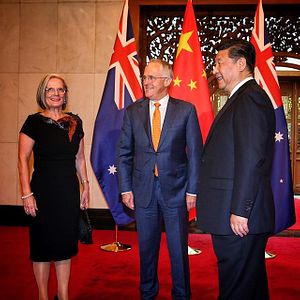Australian Prime Minister Malcolm Turnbull was in China Thursday and Friday for a fly-by visit that lasted just over 36 hours. Nonetheless, it was an important trip – as Turnbull’s first visit to China since assuming office last fall, it was important to set the tone for the Australia-China relationship under his administration.
And that tone was relentlessly upbeat, at least in the public remarks. Despite a media focus on the South China Sea issue – and Australian security officials’ real concerns about Chinese actions there, as outlined by Carl Thayer for The Diplomat – Turnbull tried to keep the focus off the territorial disputes. Asked about the issue by reporters after his meeting with Premier Li Keqiang, Turnbull said that “China understands our position… we continue to urge all claimants to settle any territorial disputes… peacefully and in accordance with international law.”
Turnbull’s main focus, however, was on economics, as shown by the 1,000-member business delegation that accompanied the prime minister. He attended a roundtable discussion with Chinese and Australian CEOs in Beijing after beginning his trip in Shanghai, China’s commercial capital. On Thursday, speaking at a gala lunch in Shanghai, Turnbull even gave a shout-out to his previous business connections to China, remembering “the exciting days” he spent working in China in the 1990s, eventually “establishing what has since become a large zinc and gold mine at Caijiaying near Zhangjiakou in Hebei Province.”
China and Australia sealed a free trade agreement in 2014, under the leadership of previous Australian PM Tony Abbott. In his address in Shanghai, Turnbull praised the early results of the FTA, which just came into force this year, as “extraordinary.” To help build on that momentum, Turnbull announced the establishment of an “Innovation Landing Pad” in Shanghai, to encourage Chinese and Australian partnerships in innovation and research and development.
He also urged China to continue the process of opening its markets to the world. “China’s own long journey towards open markets and rule-of-law will be well worth the challenges along the way,” he argued. To prove his point, Turnbull even quoted Deng Xiaoping, the father of China’s “reform and opening policy,” as saying that a “closed-door policy prevents any country from developing.”
Australia’s keen interest in economic relations with China is not hard to understand. China is of immense economic importance for Australia; as Turnbull noted, around one-third of Australian exports are destined for China. That means the Australian economy suffers along with China’s. “Australia’s terms of trade have fallen by a third since China’s shift away from resource-intensive industrial growth began in earnest,” Turnbull admitted, before arguing that Australia’s economic recovery is going strong.
Chinese President Xi Jinping had his own ideas about how to advance the bilateral relationship. In his meeting with Turnbull, Xi invited Australia to link its northern development plan with China’s Belt and Road initiative, according to Xinhua. The Chinese company Landbridge has already tapped into Australia’s maritime infrastructure, leasing Darwin port for 99 years in a move that sparked concern and criticism from Australian and U.S. security analysts.
In his visit, however, Turnbull was keen to avoid the suspicions and tensions that have colored China-Australia relations over the past few months. Instead, he sought to emphasize the positives. “In China there’s a sense of optimism for our relationship and a great affection for Australia,” Turnbull said in a Facebook post on Friday. “Our engagement is far deeper, broader and richer than often imagined.”

































